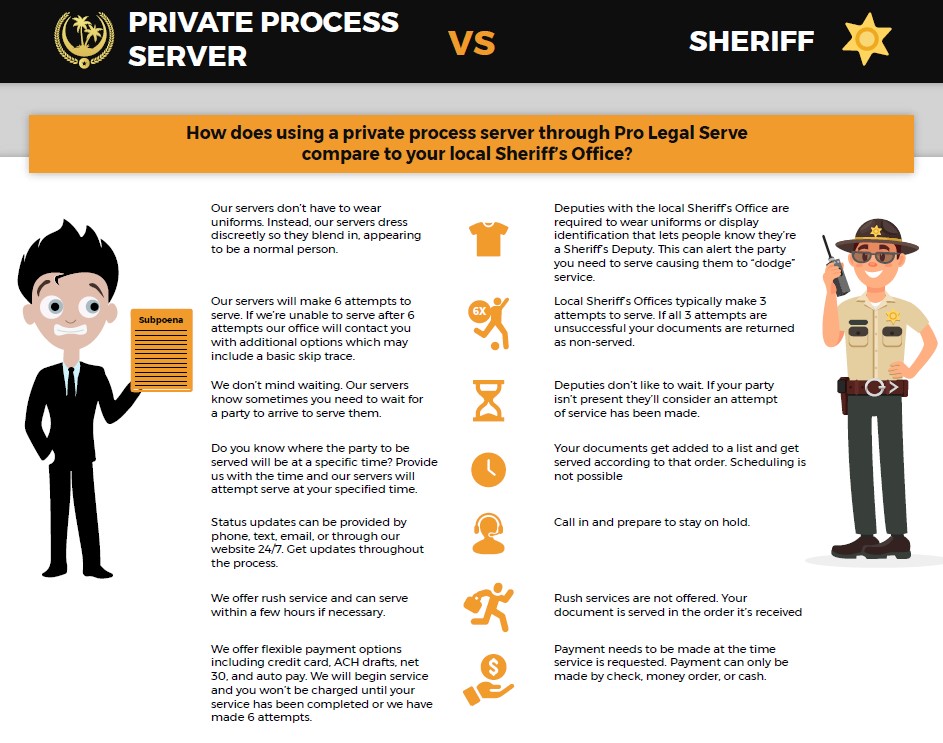The Role of Specialist Process Serving in Reliable Lawful Situation Administration
The Role of Specialist Process Serving in Reliable Lawful Situation Administration
Blog Article
Comprehending the Significance of Refine Serving in Lawful Treatments
Process serving is a basic facet of lawful treatments that makes certain all celebrations are educated of their commitments and civil liberties. The nuances of efficient procedure serving extend past mere delivery; they include legal demands and possible consequences of improper solution.
Definition of Process Offering
Refine serving is a vital part of the lawful system, defined as the formal shipment of lawful files to individuals included in a litigation. This procedure makes sure that all celebrations are effectively informed of lawsuits being taken against them or to which they are a party. Commonly, these files consist of summons, problems, subpoenas, and other court-related papers that call for the recipient's attention and reaction.
The importance of procedure offering lies in its duty in maintaining the principles of due procedure. It ensures that individuals have notice of legal proceedings, consequently offering them a possibility to react or protect themselves. Proper solution of process is not simply a step-by-step rule; it is a fundamental aspect of ensuring justness and transparency in the judicial system.
Refine offering can be performed by various people, including expert procedure web servers, legislation enforcement officers, or perhaps attorneys, relying on jurisdictional guidelines. Each method of service has its very own requirements and techniques, which are critical to stopping hold-ups or dismissals within the legal framework. Recognizing the interpretation and feature of process serving is essential for all stakeholders included in lawful process.

Legal Demands for Refine Offering
Legal requirements for process serving are important to make certain that the delivery of legal files complies with developed protocols and is recognized by the court. Each jurisdiction has particular laws regulating exactly how and when papers need to be offered, which might include problems, summonses, and subpoenas.
Generally, procedure web servers have to be neutral 3rd celebrations who are not associated with the case. They must likewise adhere to state laws pertaining to solution techniques, which can consist of individual service, substitute solution, or service by mail. Personal solution includes delivering records straight to the recipient, while alternative service enables shipment to another responsible person at the recipient's home or place of business.
Additionally, process-server are generally needed to file an evidence of service, a lawful record that verifies the delivery of documents, with the court. This document includes details such as the day, time, and method of solution, along with the name of the person served.

Duty in the Justice System
An essential part of the justice system, procedure serving guarantees that people associated with lawful proceedings are correctly informed of actions taken versus them (Process Serving). This official alert is essential for upholding the concepts of due process, which mandates that events have the opportunity to react to claims made versus them. Without efficient procedure serving, the legal system would be rendered inadequate, as people could participate in activities without recognition of pending lawful issues
Refine servers serve an important duty in safeguarding the integrity of the lawful procedure. They serve as neutral Recommended Site celebrations, providing legal documents such as summons, issues, and subpoenas, therefore promoting transparency and accountability within the judicial structure. By ensuring that all parties are informed, procedure serving helps to prevent any potential unreasonable benefit, permitting equitable engagement in legal proceedings.
In addition, the professionalism and trust of process-server contributes to the general public's count on the justice system. Their adherence to honest methods and lawful standards enhances the legitimacy of the judicial process. Eventually, effective procedure serving is indispensable in advertising the rule of regulation and guaranteeing that justice comes to all individuals associated with legal disagreements.
Consequences of Improper Solution
The repercussions of inappropriate service can dramatically undermine the integrity of lawful process. When a celebration is not served appropriately, it can result in a host of difficulties, including hold-ups in case timeline and raised legal expenses. Improper solution can lead to the offender not being aware of the lawsuit against them, which may stop them from responding suitably or presenting their defense. This absence of notification can eventually lead to default judgments, where the court policies in support of the complainant without hearing the accused's side.
Moreover, improper service can render court orders and judgments void, requiring the plaintiff to reboot the process, which can be both helpful resources financially burdensome and time-consuming. It can also unlock to charms and challenges, as the offender might suggest that they were not appropriately informed of the procedures, making complex the lawful landscape additionally.
Finest Practices for Effective Service

2nd, timing plays a crucial function. Offering files without delay can avoid hold-ups in legal procedures and guarantee that all celebrations are alerted in a timely way. Additionally, employing a specialist process-server can boost efficiency, as they are trained to make sure and browse possible difficulties conformity with neighborhood laws.
Third, preserving precise documents of the service process is critical. Documenting the date, time, and manner of solution can supply critical proof if conflicts develop regarding whether service was correctly implemented.
Final Thought
To conclude, procedure offering is a necessary component of legal procedures, ensuring that all celebrations are appropriately informed and paid for the chance to react. Complying with legal requirements and best practices not only supports the principles of due process yet also reinforces the integrity of the justice system. The consequences of improper solution can bring about considerable hold-ups and issues, highlighting the requirement for efficient process serving in promoting fairness and accessibility in lawful conflicts.
The subtleties of efficient process offering prolong beyond simple delivery; they incorporate lawful demands and potential consequences of inappropriate solution.Process offering is an important component of the legal system, defined as the official shipment of lawful papers to individuals entailed in a court situation. Without efficient process offering, the legal system would be made inefficient, as individuals might engage in activities without understanding of pending legal issues.
Process servers offer a vital duty in securing the integrity of the lawful procedure - Process Serving. The consequences of incorrect service can lead to substantial delays and this content complications, highlighting the requirement for efficient process offering in promoting fairness and accessibility in lawful conflicts
Report this page